|
|
Let’s try this writing about the books I’ve read thing again, shall we?
A Visit from the Goon Squad, Jennifer Egan – One of those books I like more in memory than I did while I was reading it, and which will probably grow in my mind over time, this contains lots of small stories about a variety of people around Bennie, “an aging former punk rocker”, and Sasha, who works for him. It’s little snapshots of the lives around both characters that reveal gradually the way that their lives turned out. I like these little vignettes, and the small pieces of human nature they reveal, but I think overall I prefer a more coherent narrative.
A Court of Mist and Fury, Sarah J. Mass – The follow-up to A Court of Thorns and Roses, this continues Feyre’s story as she has to cope with life after the events of the first book. I’m not as in love with this series as lots of people I know, but Maas has a surprisingly strong ability to tug and tug and tug on my heartstrings as she reveals more and more of what the first book only hinted at. I didn’t think I could love Rhysand and didn’t understand how others did when I very briefly skimmed the reviews of others – now I completely and totally do. Really enjoyable and really a book that suited my mood at the time I was reading it.
The Devonshires: The Story of a Family and a Nation, Roy Hattersley – This follows a chronological history of the Cavendish / Devonshire family through from Bess of Hardwick’s days to the earlier twentieth century. I’ve been to Hardwick Hall and read Bess of Hardwick (nearly 7 years ago, where on earth does time go?) so this seemed a natural progression for my interest, especially as we’re planning a visit to Chatsworth as soon as we can manage it. Parts of it were definitely better than others – for instance, I have always, always struggled with anything to do with the Stuarts, I just can’t seem to be interested. I enjoyed the beginning and especially the part about Joseph Paxton and his many innovations towards the end, but I felt it dragged significantly in the middle when the family members weren’t interesting enough on their own to hold my attention. Worth reading, but it’ll take perhaps longer than expected.
Heaven, Texas, Susan Elizabeth Phillips – The second in the Chicago Stars series, this covers the romance between Bobby Tom Denton, who’s just been forced into retirement from professional football due to an injury, and straight-laced, never-been-kissed Gracie Snow, hired simply to get him to a destination for filming. The actual romance was sweet enough, but I had real problems with the way Bobby Tom handled women – he’s completely a womaniser with a “type”, women throw themselves at him and he makes up football quizzes that women always fail (how is this possible? the logic of it got to me) to test whether they’re worthy of his hand in marriage. The whole thing made me feel uncomfortable. The author was clearly trying to portray him as a kind soul who gently lets these hoards of women down (now, anyway) and can’t let anyone in his home town down either, but it didn’t work for me, so I couldn’t get nearly enough behind the romance for my tastes.
The Last Viking: The Life of Roald Amundsen, Stephen R. Bown – I’m not sure what I expected when I bought this – I think I was attracted to the title – but I really liked it. I’m not all that familiar with the races to the North and South Poles, nor had I ever heard of Roald Amundsen, but the life of this particular adventurer caught and kept my interest throughout this book, as the author explores his motivations and his various record-breaking journeys. I find it difficult to wrap my mind around the concept of going on a five-year-long expedition, from which an explorer might not return, but reading about them, and learning a bit more about humanity’s relentless desire to find what’s out there, is awe-inspiring. Recommended.
As I’ve gone through and written these little paragraphs, I’ve realised that February wasn’t actually the best month for reading. I’ve been having some life dramas over the last month which have rattled me more than I’ve been particularly happy about, and I wonder how much my own personal situation prevented me from really enjoying any of these books – or perhaps my choice of reading didn’t exactly match what I needed as much as I’d hoped. In perfect honesty, I’m not sure that March will be a better month in life terms, not yet anyway, but something in me has been seeking this outlet again, a place to remember and reflect on what I’ve read and begin writing again.
In various other efforts to keep myself busy outside of work, I’ve been crocheting, having found the Scheepjes 2017 crochet-a-long:

A bit of baking:
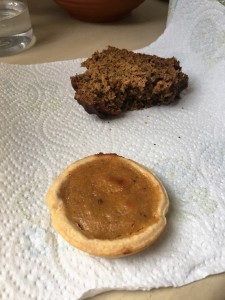
and a lot of gaming both on my own and with various friends. Of course, I’ve kept on reading as you can see – at the moment, I’m reading The Watchmaker of Filigree Street by Natasha Pulley and Binti by Nnedi Okorafor, and I will do my best to tell you about them when I’ve finished!
How was your February?
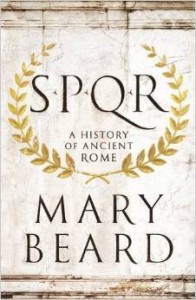 I am fortunate enough to have visited, and fallen in love with, Rome. It isn’t called The Eternal City for nothing; it’s layers upon layers of history, untold secrets still hiding underneath every building that stands there, where every turn could lead you to something ancient. The Pantheon is my favourite example, as you walk along twisty streets until suddenly, you stand in a plaza with an architectural feat looming above you. Actually magical. So worth a visit, and I find myself often longing for a repeat so I can walk those streets again. I am fortunate enough to have visited, and fallen in love with, Rome. It isn’t called The Eternal City for nothing; it’s layers upon layers of history, untold secrets still hiding underneath every building that stands there, where every turn could lead you to something ancient. The Pantheon is my favourite example, as you walk along twisty streets until suddenly, you stand in a plaza with an architectural feat looming above you. Actually magical. So worth a visit, and I find myself often longing for a repeat so I can walk those streets again.
Anyway, huge history nerd that I am, I couldn’t resist SPQR for long. When I don’t know much about a time period, one of my favourite ways to get into it is by reading a mammoth work of history first, then narrowing down into areas that specifically interest me. I feel like everyone must know bits and pieces about Rome, but putting it together in a coherent story is what’s beyond me. Mary Beard’s colossal new work on Rome is probably one of the best of this type that I’ve read. It focuses on just ancient Rome, and of course when I say “just”, it fails to encompass the enormous amount of information that Beard had to draw upon and cover, as parts of this period in history are better documented than others. It looks the period from the rise of Rome, and examines those founding myths, up to the republic and then the rise of imperial Rome, ending in 212 AD.
Beard looks at the history of ancient Rome in three ways; first, by drawing upon sources and telling us what happened, then by questioning what “traditional” sources and later interpretations have told us, and finally by analysing how people outside fame and records might have lived. I love this approach because it’s still narratively interesting, taking us mostly chronologically through Roman history, but it questions and toys with the sources that exist rather than presenting history as fact. History isn’t fact, and it shouldn’t be presented as such; so much of what we have especially in this period comes from a single source somewhere, and often a biased one, and which has been changed and misinterpreted as time goes by. Too much popular history (that I’ve read, anyway) simply tells a narrative without thinking about the sources behind that narrative and whether we can trust them or not. Beard clears away these cobwebs, as much as she can anyway, and gives us a great picture of what the republic of Rome might have been like. She’s impartial, she’s clear, she’s compelling, whether she’s discussing Nero or women in Rome or terrorism (because yes, Romans had terrorism too).
This is absolutely a book I’d recommend to anyone who is seeking to learn a little bit more about this period in history.
 I turned 30 earlier this year and, whether I feel much different or not, it is a milestone that’s made me introspective. Turning 30 means being a real adult, at least in my mind, even though it hasn’t actually heralded any life changes. It would be a lie to say that sometimes I didn’t wish I was still 20 and living with my friends at college. I could never overstate how much I loved school and learning – and how much I miss it. What strikes me most about this particular age is how much I have grown up and changed over the last decade, how much I am not that girl any more. I might not actually feel like an adult most of the time, but occasionally it strikes me that I really am. I turned 30 earlier this year and, whether I feel much different or not, it is a milestone that’s made me introspective. Turning 30 means being a real adult, at least in my mind, even though it hasn’t actually heralded any life changes. It would be a lie to say that sometimes I didn’t wish I was still 20 and living with my friends at college. I could never overstate how much I loved school and learning – and how much I miss it. What strikes me most about this particular age is how much I have grown up and changed over the last decade, how much I am not that girl any more. I might not actually feel like an adult most of the time, but occasionally it strikes me that I really am.
I have an example. This week was my company’s whole team meeting, where nearly 170 people get into one room (it’s a cinema, so it’s big enough for everyone) and various senior people in the company tell everyone about company performance, updates, and some of the cool stuff we’re doing. This time round, I was one of those senior people. I had to stand up in front of that many people and tell them what had happened in the world of SEO in the last six months. If you had known me when I was 21, or 24, or probably even 27, I’d never have managed it. Oh, I’d have done it – I have spoken before in front of groups, but never particularly well, and I really hate it. This time, though? This time I knew what I was saying. I was still terrified, but for the first time in my life I had knowledge and confidence to go up there and speak well. I wasn’t sure I was going to, but I did (or at least, that’s what everyone says). And I am so pleased with myself, even though to others this may not seem like a big deal, because I know how far I’ve come to be able to do that. I have been so shy and quiet for so many years of my life, and still am most of the time, that what I am now capable of truly astounds me. I’m the girl who never spoke up in class. I’m the girl who lurks and decides not to say anything, for fear of criticism. I’m the girl who doesn’t know how to start a conversation, who hates parties and networking and socialising unless I know someone to anchor me. I’m a wallflower. I often wonder how I ever found myself in a job, in a *career*, where most of what I do relies on talking to and influencing people. Being good at SEO and being good at managing, influencing and representing a team of SEOs are very different things. While I still definitely have a long way to go at my job, and I am plagued with doubt and uncertainty and frustrations most of the time, I feel like I’m on the way to being better. All I can do is try to be better. Yes, someone else may have done a better job than I’ve been able to. Someone else might have done it differently. But maybe I wasn’t a bad choice for this role. Maybe I can do this. Will my doubts go away? No, of course not. Will I look at other people and think they would have been the best choice? Yes, I still will. But I need to hold on to this feeling when I am overwhelmed, when I’m sure everything is all wrong.
And will I still be nervous getting up in front of all those people in six months’ time, assuming I again get the opportunity? Of course. I might be different on the outside, but inside I’m still so very shy.
So, now that I’ve popped out from the woodwork, what else have I been up to in the last few months?:
- Gaming. I tend to go through hobby phases, and I’m in a gaming phase at the moment. I’ve been playing a lot of a game called Stardew Valley, where you are a farmer attempting to revive your grandfather’s farm, alongside making friends with villagers, mining, fishing, and a few other tasks. It’ll sound familiar if you’ve ever played any of the Harvest Moon series of games, but it’s grounded more firmly in the real world (as much as a game like this can be). It’s so much fun, I’d highly recommend it. Before that, I played The Witcher and I’m partway through The Witcher 2, in an attempt to get to The Witcher 3.
- Just yesterday I crocheted for the first time in months to make this little turtle (hobby phases, like I said):
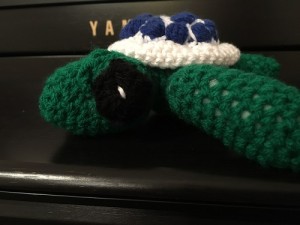
- We spent Easter weekend in a gypsy wagon in Cumbria. The weather didn’t work in our favor at all, but we had a lovely log fire, some castles nearby, and I took a lot of pictures of daffodils:
  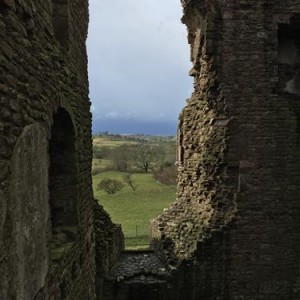
- And, of course, I’ve still been reading. That’s one thing I never stop doing. I’ve still been enjoying the freedom to re-read that comes with not blogging; I just read The Raven Cycle over again by Maggie Stiefvater and loved all of it so much, now that it’s finished. My other favorite I’ve read so far is Uprooted by Naomi Novik, which was everything I’ve ever wanted in a book. And the surprise of the year for me so far has been Cuckoo’s Calling by Robert Galbraith / J.K. Rowling – I am not sure why I chose to pick it up, but I did, and I’ve been barely restraining myself from inhaling the next two ever since. I think it’s the way Rowling draws characters. I’m not normally a mystery person, but I loved that one.
That’s it from me for today – happy May, everyone!
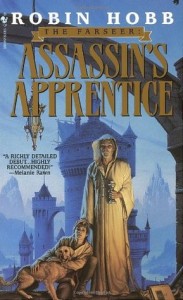 It’s fitting that, having spent most of 2015 not blogging, it’s taken me until February 2016 to finish writing about the year. But I know I’ll miss this post if I don’t write it, and I did read some amazing books in 2015. It’s fitting that, having spent most of 2015 not blogging, it’s taken me until February 2016 to finish writing about the year. But I know I’ll miss this post if I don’t write it, and I did read some amazing books in 2015.
Rereads
As my few posts in 2015 demonstrated, this was the year of rereading for me. I didn’t think I was restricted before, but I must have been in some sense so I properly indulged in rereading some of my favourite series over again in 2015. Mostly this was because new books were coming out; I reread all of Robin Hobb’s Farseer, Liveship Traders, and Tawny Man books so I could start her new series with the proper background, I reread Cinder, Scarlet, and Cress before I let myself read Winter by Marissa Meyer, I reread all of the Kate Daniels books again, and I reread Leviathan Wakes by James S.A. Corey so I could finally move on to the remaining books in The Expanse series. All of them, completely worth it, by the way; if these were new-to-me series they’d all be in the next section.
New Reads
My favourite new reads of 2015 are mostly speculative fiction. In fact, most of what I read that wasn’t fell flat for me in some way; either I’m not reading the right books or I’m just very strongly leaning towards fantasy and science ficton. I suspect the latter. The only exception was A God in Ruins by Kate Atkinson, which I loved, although probably not quite as much as Life after Life.
 Highlights from the rest of the list: Highlights from the rest of the list:
Tooth and Claw, Jo Walton – This has been billed as Pride and Prejudice with dragons and it really does feel like that; many of the social mores of a bygone English society combined with peculiarities that would only arise due to dragons living in that world led to a book that was highly enjoyable.
Station Eleven, Emily St. John Mandel – I loved this book so much I started pushing it on everyone I knew who liked reading in the slightest. I thought I’d tired of post-apocalyptic stories, but it turns out I just hadn’t read this one yet.
The Scorpio Races, Maggie Stiefvater – This book, and its characters, leapt off the page for me. Another review I’ve seen described this as a “fierce and hungry” book and that perfectly describes it. I can almost taste the salt water.
The Goblin Emperor, Katherine Addison – This is a book I let sit on my shelf for far too long. I loved Maia’s character, his honest desire to do the best he could conflicted against his shy and stifled personality, and his way of facing those who thought he was lesser due to being young and half-goblin. Also, I have a thing for political fantasy.
A Darker Shade of Magic, V.E. Schwab – I only rated this book 4 stars, but I’m not sure why – I think it’s because I wanted something to happen that didn’t. But this book has actually stuck with me and I’m very much looking forward to the sequel, so on the list it goes.
In 2016
I’d like to go back to my goals, especially to read more authors of colour, which I know I don’t do enough of if I don’t pay attention, as aptly demonstrated by the list above. There will probably be more fantasy, too, but I’ll see where whim takes me for everything else!
Hello there, blogging friends! I’ve had a couple of life changes since last we spoke, namely these two:
 
I have also been making things, like this baby blanket:
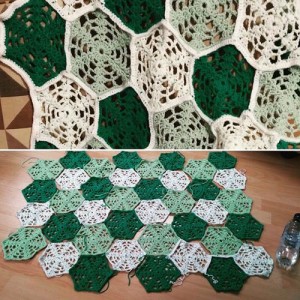
Went to see my parents and visited Thomas Edison’s workshop, home, and grave:
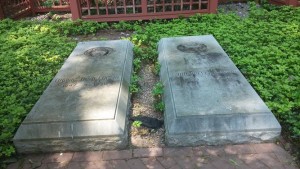
Visited Boston for the first time in several years and was honored to take part in my best friend from university’s wedding:
 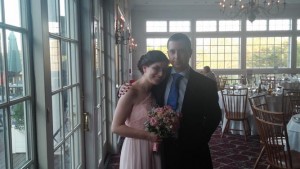
Went to Bletchley Park and saw where lots of exciting codebreaking happened – plus visited reconstructions of the oldest computers:
 
And visited places closer to home, like Rievaulx Abbey below, with friends:

I’ve also finally started volunteering at two museums here in York on Saturdays, getting a little back into history.
There are, of course, a lot of other less positive events going on, but all things considered, the last few months have been okay, and I feel I’ve made good use of summer 2015.
I’ve been doing lots of re-reading, and reading more chunksters. I’m in the middle of re-reading the Kate Daniels series by Ilona Andrews; I love these books and rediscovering that has been a joy. I hadn’t read the latest two because I did want this re-read first; it’s paid off, just like my Robin Hobb re-read earlier in the year, which I also finished during my hiatus. I spent a month reading a book about Alan Turing after visiting Bletchley Park; I’m now way behind on my reading goals, but it was fascinating. I’ve also read some books that I was really excited for, like A God in Ruins by Kate Atkinson and The Paying Guests by Sarah Waters. I am sorry I didn’t write about them, because they both haunted me in different ways, but there’s still time.
It will be my challenge this autumn to rediscover my blog, and either keep it up or let it go. In the meantime, though, I hope you all enjoy the end of your own summers.
When the sun is shining, the daffodils are out, and the weather starts to warm up, April is one of my favorite months. We had a few really nice weekends this year and I’ve been grateful for so much sunshine.
 The reading was good, too. I’ve started to fall down on a lot of my personal reading goals, and I know I shouldn’t, but I’ve felt drained and busy a lot this month and reading is always my refuge. I’ll get back on top later in the year. I read: The reading was good, too. I’ve started to fall down on a lot of my personal reading goals, and I know I shouldn’t, but I’ve felt drained and busy a lot this month and reading is always my refuge. I’ll get back on top later in the year. I read:
- The Scorpio Races, Maggie Stiefvater – I loved this. Maggie Stiefvater has so much talent and gets right into her characters’ hearts and minds without skimping on any of the scene-setting or story of her books.
- The Complete Keeper Chronicles, Tanya Huff – It hasn’t been all that long since I discovered Tanya Huff but I’ve gone on a number of binges trying to catch up on her back catalogue (love it when this happens). This is an anthology of three books in one. Although I didn’t love it as much as the Confederation series, it was so enjoyable that I tore through all three books without a break.
- Throne of Glass, Sarah J. Maas – I didn’t feel that I loved this one as much as others did, or that it had lived up to its reputation. But there was enough there for me to request the next from the library, which I appreciated a lot more. And I did love Chaol.
- Canada, Richard Ford – If I was someone who gave up on books, I’d have given up on this one. This was really a half-hearted effort to read something outside the comfort zone of my previous reads, but I just ended up not liking it very much. I liked the idea of it – a book about a child of bank robbers and his flight to Canada – more than the book itself, which is all told in past tense and felt too introspective for my tastes at the time.
- Murder of Crows, Anne Bishop – So I went right back into my comfort zone with this follow-up to Written in Red, a book that I loved. There’s something refreshingly normal about Anne Bishop’s world even as she introduces completely different concepts and complications into the lives of her characters. It’s like she doesn’t forget that, in the real world, stores have to stay open, mail has to get delivered, and people have to eat, but at the same time her worlds are populated with shape-shifters, elemental ponies, and women who can see the future when they cut themselves. Murder of Crows is just as good as Written in Red.
- The Miniaturist, Jessie Burton – I didn’t want to ruin any other fantasy by reading it after Murder of Crows so I switched to historical fiction. This book was a lot less about the miniaturist and a lot more about a small family of Dutch people than I’d expected, but it didn’t suffer for it. I loved the period feel of this book in particular. I seldom read books set in the Netherlands, let alone at the height of its power, so I liked the insight into what life may have been like alongside the different and complex story.
- Super Sad True Love Story, Gary Shteyngart – This was unfortunately another slightly “eh” book for me – it’s meant to be hilarious, but I just found the sad part to be too strong.
- Pocket Apocalypse, Seanan McGuire – Another great urban fantasy read. I’ll continue reading everything Seanan McGuire writes.
- Ms. Marvel, vol. 1: No Normal, G. Willow Wilson – This graphic novel went by quickly, about Kamala Khan’s transformation into Ms. Marvel, and I really loved it. I loved that Kamala is part normal teenager, struggling with her identity already as a minority, and part superhero who develops extraordinary superpowers. It’s a good mix, I’m looking forward to the next.
- Crown of Midnight, Sarah J. Maas – This came in for me at the library so I decided to read it straight away. I enjoyed it a lot more than the first one. The love triangle went away (woo!) and the world expanded satisfyingly. The conclusion made me very glad I’d reserved both books from the library rather than waiting!
- A Walk in the Woods, Bill Bryson – I finished the month with some non-fiction. This book has been sitting on my shelf for years even though I love Bryson’s writing, and predictably I loved this too. I never wanted to walk the Appalachian trail before, and I’m still not entirely sure I want to, but I loved Bryson’s mix of actual experience and trail history. Definitely worth a read.
How was your reading month in April?
De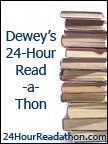 spite my lack of blogging, over the weekend I participated in the Read-a-thon! spite my lack of blogging, over the weekend I participated in the Read-a-thon!
I’ve done a good number of Dewey’s 24 hour read-a-thons in my time as a blogger and I have recently swung way back towards just focusing on the reading. I did that this time, with some added photos on Twitter and Instagram as well as seeing what other people were doing on there. I actually liked it this way and think I might limit my participation to just that in future, too. I could still get a glimpse of what people were doing while allowing myself to remain immersed in what I was reading. I think I’ll probably just make it a bit more public next time and try to get on Twitter to do a little bit more encouraging and cheering.
I couldn’t participate in the whole day. In the UK, the read-a-thon goes from 1 pm on Saturday to 1 pm on Sunday and I’m physically incapable of not sleeping, plus I’d be a wreck for work on Monday. I tend to allow myself to sleep as normal and just read on either side. I did that this time, although I only started at 5 pm since I also happened to start volunteering on the same Saturday. I’m going to finally get a little bit back into medieval history by volunteering in a couple of museums here in York, which is pretty exciting. So I read from about 5 pm until around 11 the following morning, when we went out for a late breakfast.
I read:
- Super Sad True Love Story by Gary Shteyngart – this was my current read before I started and I only had around 100 pages to go. I’m not sure how I feel about this book, to be honest. I picked it up quite a while ago and pulled it out to fulfill one of my goals of reading more of my older books. This version of America’s future is truly creepy, but it’s softened by the emotional core of the book, even if it didn’t end in quite the way that I wanted. I’m not sure I got the “hilarious” part, so perhaps not exactly the book for me. It kind of is super sad.
- Pocket Apocalypse by Seanan McGuire – I read the last Incryptid book in the read-a-thon a year ago so this was perfect timing. Alex, the star of the last book, Half-off Ragnorak and brother to Verity Price, star of the first two, now finds himself headed to Australia with girlfriend Shelby to cure a werewolf problem. So enjoyable and so perfect for a read-a-thon.
- Ms Marvel, vol 1. – I loved this. Kamala just felt so right to me. I think the second volume is out and I want it NOW.
- Crown of Midnight by Sarah J. Maas – I actually started this right at the end of my read-a-thon time and then finished it over the course of Sunday. I was kind of eh on the first book in this series, Throne of Glass, (love triangles why?) but I have read so many great reviews of the third one that I decided to continue. It was a library book and the first was a quick read, so I thought it would be a good one to finish off the day. This was a better book in every way, fortunately – primarily because Celeana felt more like a real person and not a silly teenage girl that can somehow kill people. It’s true that I guessed the surprise “twist” early on, although maybe everyone does, but I really liked it and had trouble putting it down. I am now glad that I borrowed two and three from the library at the same time. I can catch up easily and get on schedule with everyone else anxiously awaiting the next book.
So that was my read-a-thon! Did you participate this time? How was yours?
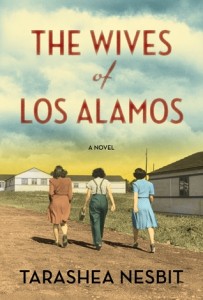 When the top physicists in the United States – and many from the rest of the world – were assigned to Los Alamos to build the atomic bomb, so were their wives. Though their experiences were different, much of it was the same; the arrival, the mystery, the lies, and the way that life went on. The wives, strangers at first, grow to know one another and to rely on each other in the absence of the men who used to influence so many of their activities. This book takes an unusual perspective, that of all of the women, to highlight the differences amongst them while telling the story of the events that shaped their lives. When the top physicists in the United States – and many from the rest of the world – were assigned to Los Alamos to build the atomic bomb, so were their wives. Though their experiences were different, much of it was the same; the arrival, the mystery, the lies, and the way that life went on. The wives, strangers at first, grow to know one another and to rely on each other in the absence of the men who used to influence so many of their activities. This book takes an unusual perspective, that of all of the women, to highlight the differences amongst them while telling the story of the events that shaped their lives.
In this book, there is no “I”. There is only “we”, as in the collective. All of the women had to keep their lives secret from families and friends elsewhere. All of the women had to lie about what their husbands were doing and where exactly they lived. All of the women were mostly left to their own devices in a dusty, half-built town, often with children to raise and houses to maintain all by themselves, wondering what exactly had led them to this point in their lives. And yet somehow Nesbit does manage to get individuality across, a reminder that every woman is different.
The book takes us through most of the time that the scientists of the Manhattan Project and their wives spent at Los Alamos, telling the story through lots of different eyes rather than just a single pair. I’ve had an interest in this since I read Age of Radiance a few months ago, and I liked getting the perspective of the many women who lived through this rather than just the mostly male scientists. This is naturally fictionalised, but I liked how it got into the heads of so many women, imagining what this experience must have been like. Really enjoyable and recommended.
I received this book for free for review consideration.
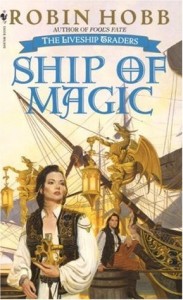 I want to start this post by saying that I adored this trilogy when I read it the first time. I remember loving it so much that I proceeded to push it on all the people that I knew at the time. My expectations were high. After my really enjoyable reread of the Farseer trilogy, they actually went up. I want to start this post by saying that I adored this trilogy when I read it the first time. I remember loving it so much that I proceeded to push it on all the people that I knew at the time. My expectations were high. After my really enjoyable reread of the Farseer trilogy, they actually went up.
Like I experienced last month, I was surprised by how much I’d forgotten about these books. In this case, I at least remembered the characters and the beginning of the trilogy in particular, mainly because I think I read it after both the Farseer and the Tawny Man trilogies the first time. But by the time I was in the middle of the second book it was like experiencing everything again with no knowledge of what had come before. It’s honestly been a surprise to me how much reading things I thought I remembered has been like reading them for the first time. I wonder if it will stick a little bit more now that it’s been through twice, but I have enjoyed letting these books take me on the same exciting journey they did over a decade ago.
Anyway, on to this particularly trilogy. The books are set in the same world as the Farseer trilogy, but further to the south in Bingtown, a small settlement on the Cursed Shores. Bingtown governs itself through the Traders’ Council, but are subject to a larger country called Jamaillia and ruled by the Satrap. Althea Vestrit, a Trader’s daughter, is waiting to take on her father’s ship, the Vivacia; her father is unwell and on his death the liveship will awaken. After three deaths, a liveship awakens, as the wizardwood figurehead has absorbed enough life experience and memories to take on the characteristics of a member of that family. Althea has been with Vivacia for years, in the place of her brothers who died of the Blood Plague before she was born, and fully expects to guide young Vivacia through her awakening. But when Ephron Vestrit dies, nothing goes as expected, and the small saga of the Vestrit family becomes wrapped up in many larger events. the Traders’ Council, but are subject to a larger country called Jamaillia and ruled by the Satrap. Althea Vestrit, a Trader’s daughter, is waiting to take on her father’s ship, the Vivacia; her father is unwell and on his death the liveship will awaken. After three deaths, a liveship awakens, as the wizardwood figurehead has absorbed enough life experience and memories to take on the characteristics of a member of that family. Althea has been with Vivacia for years, in the place of her brothers who died of the Blood Plague before she was born, and fully expects to guide young Vivacia through her awakening. But when Ephron Vestrit dies, nothing goes as expected, and the small saga of the Vestrit family becomes wrapped up in many larger events.
The main thing that appeals to me about this series, especially this time, is the amazing ladies who make up the cast of the books. Brave, determined Althea is still my favorite, but this time, I much more appreciated the depth and variety of the other women who make up this world. Keffria, who thought she just wanted to hide behind her husband but actually has the strength and will to take care of herself. Ronica, who has been capable all her life but has to admit her mistakes. Even Malta, starting off a spoiled and incredibly irritating girl, eventually sees the wider picture. The huge changes that take place for everyone, the way they learn and develop and change, are a big part of the book, even as the events sweep them along as much as the readers. The people who start out these books are not the same people who end them, and it feels realistic and believable.
It’s not just that, though – it’s that Robin Hobb has the ability to help you see things from so many characters’ points of view. Kyle Haven, for instance, acts in a way that is incomprehensible to many of the characters, but in his own head, his views make sense (which is disturbing as a reader). Keffria finds herself swayed along with her husband because he can argue relentlessly and act as though logic backs him up, when in reality it doesn’t. He’s a product of his culture, so even as we revile him as readers we can reluctantly understand how he ended up being that way. Malta is kind of similar to this, and in fact Althea even says she could see herself in Malta, had she been stuck in the house and forced to conform to the stereotypes of female behavior when it ill-suited her personality. I love this, and I think it’s a big reason why this trilogy is my favorite. I adore Fitz, from the other two trilogies, but I even more appreciate seeing so many viewpoints and understanding the population of this society.
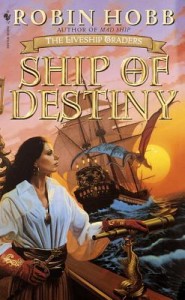 The plot, of course, is fantastic, and had me completely swept up in it, particularly in the final book. I forgot what happened so I was swept along, breathless page after page, more or less ignoring actual chores and responsibilities to read this book (who could do washing up when someone’s life is on the line??). It is wide-ranging across lots of different territories, involves king-making and romance and danger and friendship and madness and healing and so much more. It has both that appeal of a closed environment – the liveships – and the sense of a wider, varied world, along with a rich and fascinating history. The plot, of course, is fantastic, and had me completely swept up in it, particularly in the final book. I forgot what happened so I was swept along, breathless page after page, more or less ignoring actual chores and responsibilities to read this book (who could do washing up when someone’s life is on the line??). It is wide-ranging across lots of different territories, involves king-making and romance and danger and friendship and madness and healing and so much more. It has both that appeal of a closed environment – the liveships – and the sense of a wider, varied world, along with a rich and fascinating history.
The only part that I felt was somewhat less appealing was the sections about the serpents. They’re important, but they’re infrequent and mostly consist of searches for She Who Remembers and various worries about how they haven’t found her and are starving. But this is a very small part of a series of books that consumed my thoughts and culminated in a very happy reader.
With that, I’ll stop gushing; but if epic fantasy is something you enjoy, and you haven’t read this trilogy yet, you should. No real need to read the Farseer trilogy first, but of course, they do loosely tie together and are actually chronologically immediately after in terms of the wider world story, so I would recommend it. I’m so glad I’m still loving these books just as much as I did the first time.
January felt slow while it was happening, but now it’s hard to believe that it’s February! I turned 29, watched the first season of Angel, did a whole bunch of crocheting, and carried on as normal with everything else. I wrapped up this month by getting sick – not quite ill enough to miss doing anything but too ill to really have energy or feel up to much outside of work. Fortunately, that illness has turned into a cold, and so I’m hoping it will pass soon as we get into February.
This month I read:
- Assassin’s Apprentice, Robin Hobb
- Royal Assassin, Robin Hobb
- Assassin’s Quest, Robin Hobb
- Arlington Park, Rachel Cusk
- Ship of Magic, Robin Hobb
- A Line in the Sand: Britain, France, and the Struggle that Shaped the Middle East, James Barr
- Norwegian Wood, Haruki Murakami
The problem that arises when you’re reading a lot of Robin Hobb is that no other books really appeal in quite the same way. So both Arlington Park and Norwegian Wood felt like disappointments to me. I’m not too surprised I didn’t like the Murakami a huge amount, because I think I read one of his previously and wasn’t too keen. Both of those off to the charity shop, clearing a bit of space on the shelves. A Line in the Sand was fascinating, though horrifying, and almost painful to read. It’s ridiculous what can happen to people when another country’s government decides to intervene, with no actual consideration besides what will benefit that particular country (or politician). I’d recommend it – I think it provides an informative backdrop to current events in the Middle East, if a depressing one.
Ahead this month, undoubtedly more Robin Hobb. And I’ve finally got my hands on Station Eleven by Emily St. John Mandel – I don’t think I’m going to wait long to start that.
What’s ahead for you in February?
|
|




 I am fortunate enough to have visited, and fallen in love with, Rome. It isn’t called The Eternal City for nothing; it’s layers upon layers of history, untold secrets still hiding underneath every building that stands there, where every turn could lead you to something ancient. The Pantheon is my favourite example, as you walk along twisty streets until suddenly, you stand in a plaza with an architectural feat looming above you. Actually magical. So worth a visit, and I find myself often longing for a repeat so I can walk those streets again.
I am fortunate enough to have visited, and fallen in love with, Rome. It isn’t called The Eternal City for nothing; it’s layers upon layers of history, untold secrets still hiding underneath every building that stands there, where every turn could lead you to something ancient. The Pantheon is my favourite example, as you walk along twisty streets until suddenly, you stand in a plaza with an architectural feat looming above you. Actually magical. So worth a visit, and I find myself often longing for a repeat so I can walk those streets again. I turned 30 earlier this year and, whether I feel much different or not, it is a milestone that’s made me introspective. Turning 30 means being a real adult, at least in my mind, even though it hasn’t actually heralded any life changes. It would be a lie to say that sometimes I didn’t wish I was still 20 and living with my friends at college. I could never overstate how much I loved school and learning – and how much I miss it. What strikes me most about this particular age is how much I have grown up and changed over the last decade, how much I am not that girl any more. I might not actually feel like an adult most of the time, but occasionally it strikes me that I really am.
I turned 30 earlier this year and, whether I feel much different or not, it is a milestone that’s made me introspective. Turning 30 means being a real adult, at least in my mind, even though it hasn’t actually heralded any life changes. It would be a lie to say that sometimes I didn’t wish I was still 20 and living with my friends at college. I could never overstate how much I loved school and learning – and how much I miss it. What strikes me most about this particular age is how much I have grown up and changed over the last decade, how much I am not that girl any more. I might not actually feel like an adult most of the time, but occasionally it strikes me that I really am.



 It’s fitting that, having spent most of 2015 not blogging, it’s taken me until February 2016 to finish writing about the year. But I know I’ll miss this post if I don’t write it, and I did read some amazing books in 2015.
It’s fitting that, having spent most of 2015 not blogging, it’s taken me until February 2016 to finish writing about the year. But I know I’ll miss this post if I don’t write it, and I did read some amazing books in 2015. Highlights from the rest of the list:
Highlights from the rest of the list:








 The reading was good, too. I’ve started to fall down on a lot of my personal reading goals, and I know I shouldn’t, but I’ve felt drained and busy a lot this month and reading is always my refuge. I’ll get back on top later in the year. I read:
The reading was good, too. I’ve started to fall down on a lot of my personal reading goals, and I know I shouldn’t, but I’ve felt drained and busy a lot this month and reading is always my refuge. I’ll get back on top later in the year. I read: spite my lack of blogging, over the weekend I participated in the
spite my lack of blogging, over the weekend I participated in the  When the top physicists in the United States – and many from the rest of the world – were assigned to Los Alamos to build the atomic bomb, so were their wives. Though their experiences were different, much of it was the same; the arrival, the mystery, the lies, and the way that life went on. The wives, strangers at first, grow to know one another and to rely on each other in the absence of the men who used to influence so many of their activities. This book takes an unusual perspective, that of all of the women, to highlight the differences amongst them while telling the story of the events that shaped their lives.
When the top physicists in the United States – and many from the rest of the world – were assigned to Los Alamos to build the atomic bomb, so were their wives. Though their experiences were different, much of it was the same; the arrival, the mystery, the lies, and the way that life went on. The wives, strangers at first, grow to know one another and to rely on each other in the absence of the men who used to influence so many of their activities. This book takes an unusual perspective, that of all of the women, to highlight the differences amongst them while telling the story of the events that shaped their lives. I want to start this post by saying that I adored this trilogy when I read it the first time. I remember loving it so much that I proceeded to push it on all the people that I knew at the time. My expectations were high. After my really enjoyable reread of
I want to start this post by saying that I adored this trilogy when I read it the first time. I remember loving it so much that I proceeded to push it on all the people that I knew at the time. My expectations were high. After my really enjoyable reread of  the Traders’ Council, but are subject to a larger country called Jamaillia and ruled by the Satrap. Althea Vestrit, a Trader’s daughter, is waiting to take on her father’s ship, the Vivacia; her father is unwell and on his death the liveship will awaken. After three deaths, a liveship awakens, as the wizardwood figurehead has absorbed enough life experience and memories to take on the characteristics of a member of that family. Althea has been with Vivacia for years, in the place of her brothers who died of the Blood Plague before she was born, and fully expects to guide young Vivacia through her awakening. But when Ephron Vestrit dies, nothing goes as expected, and the small saga of the Vestrit family becomes wrapped up in many larger events.
the Traders’ Council, but are subject to a larger country called Jamaillia and ruled by the Satrap. Althea Vestrit, a Trader’s daughter, is waiting to take on her father’s ship, the Vivacia; her father is unwell and on his death the liveship will awaken. After three deaths, a liveship awakens, as the wizardwood figurehead has absorbed enough life experience and memories to take on the characteristics of a member of that family. Althea has been with Vivacia for years, in the place of her brothers who died of the Blood Plague before she was born, and fully expects to guide young Vivacia through her awakening. But when Ephron Vestrit dies, nothing goes as expected, and the small saga of the Vestrit family becomes wrapped up in many larger events. The plot, of course, is fantastic, and had me completely swept up in it, particularly in the final book. I forgot what happened so I was swept along, breathless page after page, more or less ignoring actual chores and responsibilities to read this book (who could do washing up when someone’s life is on the line??). It is wide-ranging across lots of different territories, involves king-making and romance and danger and friendship and madness and healing and so much more. It has both that appeal of a closed environment – the liveships – and the sense of a wider, varied world, along with a rich and fascinating history.
The plot, of course, is fantastic, and had me completely swept up in it, particularly in the final book. I forgot what happened so I was swept along, breathless page after page, more or less ignoring actual chores and responsibilities to read this book (who could do washing up when someone’s life is on the line??). It is wide-ranging across lots of different territories, involves king-making and romance and danger and friendship and madness and healing and so much more. It has both that appeal of a closed environment – the liveships – and the sense of a wider, varied world, along with a rich and fascinating history.






Recent Comments